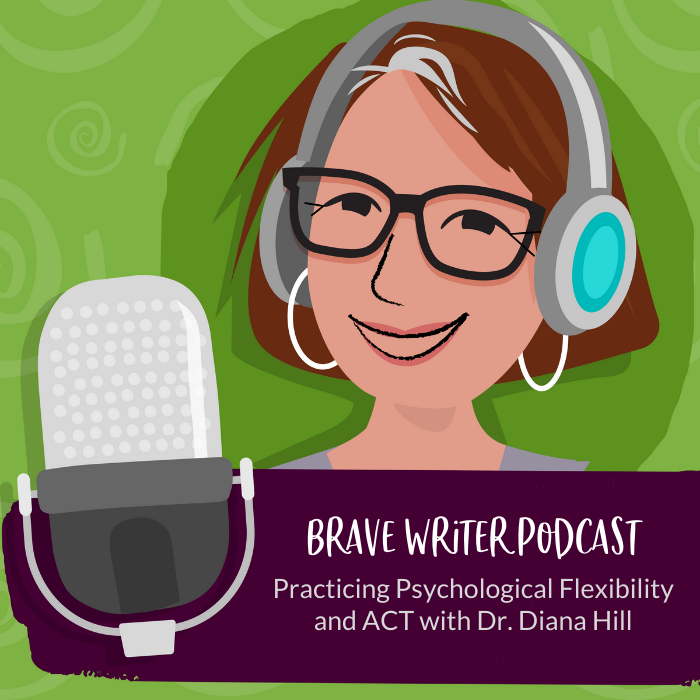Podcast: Practicing Psychological Flexibility and ACT with Dr. Diana Hill

The podcast has been dark for a few months… and for a good reason! I just wrapped up writing my newest book (out February 2022). Now that it’s in the hands of publishers, I’m ready to get back to the business of podcasting.
The theme for this season comes from the topic of the book: Critical thinking. Let’s peel back the layers and get a closer look at what it means to be a critical thinker.
Dr. Diana Hill is a psychologist and podcaster with Off The Clock Psychologists. At the beginning of the pandemic, when so many people unexpectedly had their children at home with them, Dr. Hill discovered Julie’s book The Brave Learner. She used the ideas in The Brave Leaner to become a home educator herself.
In today’s podcast, Diana talks about how to create a better relationship with ourselves. She has co-authored a therapeutic personal journal that features a practice called Acceptance and Commitment Therapy (ACT). ACT is cutting-edge, evidence-based psychology that helps people develop psychological flexibility. Psychological flexibility is one of the best indicators of effective parenting, and recent research shows that psychological flexibility reduces the impact of pandemic stress on families and kids.
Psychological flexibility involves directing yourself towards your values — even in the face of difficulty and challenges. It takes skills in acceptance, perspective taking, values, being present, stepping back from thoughts, and commitment to become psychologically flexible. The ACT Daily Journal breaks psychological flexibility into an eight-week program that helps people in each of these skills to get present, identify their values, and take committed action in the direction that matters most to them.
Listen to the Podcast
Show Notes
Psychological Flexibility and the Six Core Processes:
- Acceptance
- Cognitive Defusion
- Being Present
- Self as Context
- Values
- Committed Action
Why do we need psychological flexibility?
Humans are designed to avoid pain and move towards pleasure, which can work well in the external world but leads to issues under the skin. If something matters to you, there is likely a degree of discomfort associated with it because our values are closely related to pain and discomfort. Psychological flexibility is required for critical thinking because it allows us to move outside of our comfort zone.
Psychological flexibility also has great effects on anxiety. We are constantly telling ourselves stories about what’s happening, and when those stories are scary, we tend to want to control it or change it, and the mind doesn’t like that. The more we try not to think about something, the more the mind will want to focus on it.
Applying Psychological Flexibility to an “I Am” Statement
Any time you have a self-statement that starts with “I am,” “I am not,” “I always,” or “I never,” you are likely caught in a self-story.
Write out a statement. For example, “I am terrible at math.” This exercise works with either a positive or negative statement.
Now read the sentence to yourself and then add “sometimes” to the end. “I am terrible at math, sometimes.”
Now circle the words “I am.” That’s the one thing that is solid in that sentence. The other stuff — the self-statements, the belief systems, and the stories — we hold onto for eons. We are more than the stories that our minds create about us. Creating fixed mindsets, even positive ones like “I am smart,” are not helpful for academic success.
Values vs. Restrictions
The way to conceptualize a value is as an adverb or verb. Values are personal, and they are chosen. They are different than shoulds, rules, or morals. They are qualities of action that we bring to who and what is vital in our life.
It’s essential to tune into how our values make us feel. When we act a certain way, does it feel good or bad? Helping our children tune into their bodies can help clarify what values are and why it can sometimes feel good in the short term to act outside of them, but it does not match who we want to be in the long term.
The ACT Daily Journal helps to walk you through the six core steps of psychological flexibility. These techniques have been locked away in psychology academia, but these are practices that we can use in our own lives. Journaling and writing are some of the ways that we can explore these processes.
Resources
- drdianahill.com
- Instagram: @drdianahill
- Read: ACT Daily Journal
- Listen: Psychologists Off the Clock
- Learn about our Brave Learner Home membership and our special offer at bravewriter.com/specialoffer
- Want help getting started with Brave Writer? Head over to bravewriter.com/getting-started
- Sign up for the Brave Writer Newsletter to learn about all of the special offers we’re doing in 2020 + you’ll get a free 7-Day Writing Blitz guide just for signing up: bravewriter.com/writing-blitz
Connect with Julie
- Instagram: instagram.com/juliebravewriter
- Twitter: twitter.com/bravewriter
- Facebook: facebook.com/bravewriter

















